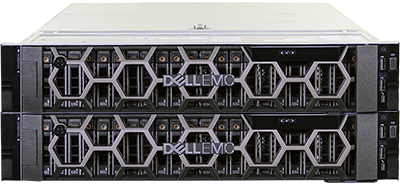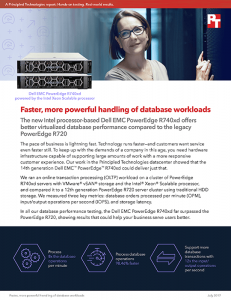The more orders and other transactions your server can process, the more business you can sustain. Your organization may get on fine with your current infrastructure—but a new product launch, an unexpected influx of customers, or a routine expansion of services could interrupt business as usual and leave your customers with a poor level of service. When your customers aren’t happy, they may not be your customers for much longer. That’s why it’s important for you to invest in new technologies that can help elevate your services and keep operations running smoothly.
In our datacenter, we tested the new Intel processor-powered 14th generation Dell EMC PowerEdge R740xd with an all-flash VMware vSAN configuration. When we compared the new solution to legacy PowerEdge R720 servers with hard disks, the PowerEdge R740xd with VMware vSAN offered superior performance in all three metrics we tested. By relying on cutting-edge technologies—including the new Intel Xeon Scalable processors, all-flash SATA and NVMe SSDs, and VMware vSAN—this new Dell EMC solution could help you better serve your demanding applications in a competitive and unpredictable business landscape.
Let’s dive into the details. Our testing entailed running an OLTP workload on two clusters: one based on Dell EMC PowerEdge R740xd servers with an all-flash VMware vSAN configuration, and another based on Dell PowerEdge R720 servers with traditional hard disks. We used DVD Store 2, a testing tool that simulates ecommerce activity, to measure each cluster’s performance along three key metrics: database orders processed per minute (OPM), input/output operations per second (IOPS), and storage latency.
![]()
![]()
![]()
In all our testing, the Dell EMC PowerEdge R740xd far surpassed the older-generation PowerEdge R720. The newer server with VMware vSAN processed eight times the database operations per minute, processed database operations 98.46 percent faster, and supported 12 times the input/output operations per second.
Given these results, this Dell EMC and VMware solution could give your organization clear advantages:
Handle more database operations. The PowerEdge R740xd cluster with vSAN processed an average of 78,787 database operations per minute per VM— eight times more than the PowerEdge R720 server cluster. With the ability to handle dramatically more customer operations, your business can take on more users, with the potential for increased revenue.
Serve customers better with fast response times. Your customers and users expect a fast response time from the services they rely on, and if they have to wait because of old servers, they may grow dissatisfied or choose to take their business elsewhere. Fortunately, the Dell EMC PowerEdge R740xd cluster could help you offer users a more responsive experience, delivering 98.46 percent lower storage latency than the older solution.
By increasing the performance of the servers in your datacenter, you could also cut down on your datacenter footprint. With a higher-performing solution, you need less hardware to do the same amount of work.
Whether you upgrade to prepare for more business or to handle all your current work with a smaller datacenter footprint, you could find benefits for your company by choosing the Intel Xeon Scalable processor-powered Dell EMC PowerEdge R740xd with all-flash VMware vSAN. In our hands-on tests, the PowerEdge R740xd proved to be a high-performing workhorse, processing eight times the OPM and 12 times the IOPS with 98.46 percent lower latency than the legacy PowerEdge R720. Our results show that purchasing these newer, more powerful servers with software-defined storage can enable you to better serve your current users and make room for future growth.
Learn more by reading the full report at facts.pt/7PjXq2 or reviewing the infographic at facts.pt/sQKehs.
This blog was commissioned by Dell Technologies.









